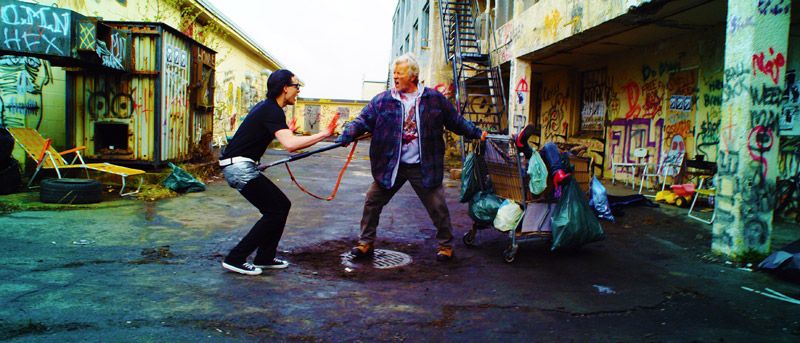Hobo with a Shotgun, director Jason Eisener's ode to the grindhouse slasher fare of the '70s, arrives On Demand Friday and in theaters on May 6. Coming from the man who birthed Treevenge into the world, the story of a homeless man who fights injustice with the business end of a pump-action boomstick might seem a little tame. The movie is anything but, though, thanks largely to the efforts of its star, the legendary Rutger Hauer.
Spinoff Online was fortunate enough to spend the better part of an hour chatting about the film with Hauer. The veteran actor was quick to credit his director for always keeping the rapid-fire production schedule on course while sticking to his vision. Fair warning: Spoilers lie ahead.
"I think he made a very strong film and his mind was clear about what he was doing and what he was hoping to get," Hauer said. "Everybody helped out, and they were all so on and focused. I've never [worked on] a film where the crew was so together."
Hauer believes that Eisener sought him out because of the added layer he could bring to the Hobo character amid the "flying limbs and heads and toenails and whatever you had."
"He knew I was going to give him something that would layer it up," Hauer said, adding, "and that's what he felt he needed. So we were really clear about what we wanted to do for it from the start. Once he shot a ton of material, he had to find a balance for the two layers."
One element that Hauer fought for, which also didn't ultimately make its way into the final cut, was a more established backstory for the Hobo. "I thought this Hobo needs to have some sort of history we agree on, and there was none."
The problem as he saw it was that the character was too one-dimensional. He arrives in this burned-out city with only one desire: to get a lawnmower and use it to start building a business, and a life. It is only when he finally has enough money to buy his precious mower that tragedy strikes, and he reaches instead for a shotgun.
"That's very simple thinking," Hauer said of his character's motivations. "So I felt we needed to come up with some sort of backstory where we understood where he came from." Eisener ended up shooting the material and not using it in the end, for which his star applauded him.
The production as a whole was marked by a rich exchange of ideas between the cast and the crew. Hauer recalls one scene in particular in which he gave his director the verbal equivalent of a clarity-inducing slap in the face.
"I know in the pressure of the moment [it's easy to get carried away]," he said. "There's one moment in the film where there are ... five people storming through a room and the Abby character (Molly Dunsworth) [has] got a saw in her neck and the guy is cutting her. At this moment the hobo needs to realize that if he doesn't do something quick ... shit's [going to get] really bad."
"I remember they were arguing how the Hobo would get into the room and how he would get out [of the motel]," Hauer continued. "And I said to them, 'Guys, this isn't a movie about explaining how he gets there. Just let him get there fuckin' just in time. You don't need to explain everything!' I remember screaming to Jason and saying 'Stop it! Just stop this! It's bull-SHIT!' And he applauded."
The film's bloody conclusion was also an idea that was revisited and discussed over the length of the production. It turns out that another ending was shot, one that continues the story story thread the theatrical cut ends on with an epilogue in which Abby has become the city's new queen, ruling over all with help from the movie's armored two-man gang, The Plague.
"I said to [Eisener], 'Show me an ending that I can believe,'" Hauer said, adding that the idea with Abby taking over was "clever, but it wasn't right." It seems that the studio wanted a happier ending, but the director fought back and eventually got his way, which Hauer appreciated.
"Good for Jason for holding on, because you cannot fuck people over like that," he said. "You had to end it right [with my character dying]. I've died like 60 times in movies -- I've had that counted. I hold the Guinness record for this, although it's not in the Guinness records book and doesn't need to be ... but that's just how [Hobo with a Shotgun] has to end. You can't please everybody and we fucking don't want to, do we?"
He added, "It's an interesting package, to make such a crazy movie about such a nice man who is in such a corner. It's all there. It's all part of the pixels for the character." The gruesome end that the Hobo meets is sad, in a sense, but it is also inevitable and necessary to carry across the underlying idea behind the movie.
"The whole thing about the shotgun is, you're going to get to the wrong end of it," Hauer explained. "That's really the message of the movie."
"We're saying, if you want to do justice with a gun, go fuck yourself again. It's not happening. It lasts a little bit, but not very long. Not a lifetime."


